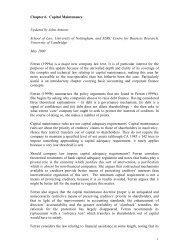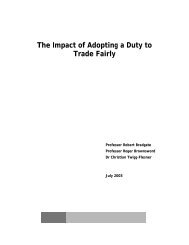From Exuberant Youth to Sustainable Maturity - DTI Home
From Exuberant Youth to Sustainable Maturity - DTI Home
From Exuberant Youth to Sustainable Maturity - DTI Home
Create successful ePaper yourself
Turn your PDF publications into a flip-book with our unique Google optimized e-Paper software.
The key priority for the UK industry is <strong>to</strong> identify and<br />
understand the drivers of its success in Europe in<br />
order <strong>to</strong> defend that position and use the lessons <strong>to</strong><br />
make further inroads in<strong>to</strong> the US market. The<br />
Japanese market should be left <strong>to</strong> others <strong>to</strong> initially<br />
open up because of the closed nature of the<br />
Japanese market and the general lack of scale of UK<br />
games companies.<br />
3.1.6 Balance of trade<br />
The UK games industry is a significant export earner<br />
for the UK, with Screen Digest estimating that UK<br />
developed games generated more than £1.1bn in<br />
retail sales outside the UK in 2000 24 . In 1999 and<br />
2000, the level of net exports fell from their 1998<br />
level but this was largely due <strong>to</strong> the transition <strong>to</strong> the<br />
new generation of consoles and was accompanied<br />
by a strong fall in imports in 1999, leading <strong>to</strong> a net<br />
increase in the balance of trade. Import levels rose<br />
dramatically again in 2000, reflecting the launch of<br />
the Playstation 2 in Japan and the US before the UK,<br />
with a launch catalogue largely composed of US and<br />
Japanese-developed games. However, in 2000, the<br />
UK games industry still delivered a positive trade<br />
balance of £186m.<br />
It provided a <strong>to</strong>tal positive trade contribution of more<br />
than three-quarters of a billion (£757m) in the course<br />
of the preceding three years (1997-1999), comparing<br />
highly favourably <strong>to</strong> film (£462m) and television (a<br />
negative contribution of £944m) over the same<br />
period.<br />
It should be noted that this level of exports is<br />
achieved without industry-specific incentives such as<br />
those enjoyed by the film industry.<br />
Exhibit 21: UK cultural balance of trade (£m)<br />
Leisure<br />
software<br />
Film<br />
Television<br />
1997<br />
454<br />
438<br />
313<br />
192<br />
419<br />
606<br />
262<br />
19<br />
-293<br />
1998 1999 2000<br />
exp imp bal exp imp bal exp imp bal exp imp bal<br />
503<br />
427<br />
444<br />
284<br />
374<br />
692<br />
Source: Screen Digest – Interactive leisure software, market assessment and<br />
forecasts <strong>to</strong> 2005<br />
219<br />
53<br />
-248<br />
482<br />
984<br />
440<br />
206<br />
592<br />
843<br />
276<br />
392<br />
-403<br />
488<br />
-<br />
-<br />
302<br />
-<br />
-<br />
UK COMPETITIVENESS SUMMARY<br />
Exhibit 22: UK balance of trade for leisure software<br />
(£m)<br />
3.1.7 Total value generated<br />
The UK has built a vibrant and highly valuable<br />
games software industry which generated £1.16bn of<br />
value for the UK in 2001 from retail, distribution and<br />
publishing margins, development advances and<br />
royalties 25 .<br />
The value captured by each sec<strong>to</strong>r in the UK PC and<br />
console games industry value chain has been<br />
defined as follows:<br />
• Retail: Estimated gross profit for PC and console<br />
games software sales<br />
• Distribution: Estimated gross profit for distribution<br />
• Publishing: Estimated gross profit from publishing<br />
activities. Value generated from in-house<br />
publishing activities is specifically excluded and<br />
included in the value of the development sec<strong>to</strong>r<br />
(see below)<br />
• Development: All activity generated by<br />
development activity by UK-based teams. This<br />
has been separated out in<strong>to</strong> UK based<br />
independent developers, UK based in-house<br />
developers for UK publishers and UK based inhouse<br />
developers for non-UK publishers 26 . This<br />
value encompasses development costs, royalties<br />
generated for independents and profits for inhouse<br />
studios.<br />
The definitions used here differ from those used by<br />
the ONS in its calculation of value-added.<br />
24 Source: Screen Digest - Interactive leisure software, market assessment and forecasts <strong>to</strong> 2005<br />
25 Source: Spectrum games industry forecasts<br />
26 Note: We have included developers owned by non-UK publishers because much of the value generated by these is likely <strong>to</strong> be kept within<br />
the UK, unlike non-UK publishing activity, the contribution of which <strong>to</strong> the UK is more difficult <strong>to</strong> measure in value terms<br />
186<br />
-<br />
-<br />
600<br />
500<br />
400<br />
300<br />
200<br />
100<br />
0<br />
-100<br />
-200<br />
-300<br />
-400<br />
1997<br />
Source: Screen Digest - Interactive leisure software, market assessment and<br />
forecasts <strong>to</strong> 2005<br />
Competitiveness analysis of the UK games software sec<strong>to</strong>r Main report 19<br />
1998<br />
Exports Imports Balance<br />
1999<br />
2000
















